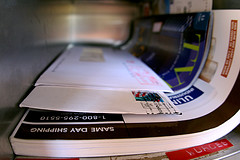You Have To Pay Suddenlink Whether They Bill You Or Not
You have to pay your bills, whether you’ve received a bill or not. That’s not much of a newsflash to most adults, but it’s kind of a problem for Ted. While he was deployed overseas, Suddenlink decided to stop sending e-bills to his bank. He could deal with those bills easily online, but it’s harder to pay a bill if you don’t receive one. They tried to sell him on autopay services. “Nice try,” said Ted.
Last summer, without announcing a change, Suddenlink stopped providing e-bills to my bank, and presumably others as well. I noticed only when more than a month had passed without an automatic payment being made from my bank. When I contacted Suddenlink, they offered no explanation for stopping the service without any notice. The two main points the rep kept repeating were 1) it is my responsibility to pay whether they bill me or not and 2) I should sign up for their auto-pay service. I tried the deployed military card since I was in the desert in the middle of a 5-month deployment, but they refused to waive the late fee. I declined to trust yet another provider with my banking information and switched to paper bills.
In November 2012 my bank notified me Suddenlink resumed e-bill service. I signed up and was able to pay my December bill without a problem. Yesterday on my bank site I noticed I’ve missed January’s due date without receiving a bill or making a payment on time. Looks like I’ll have to go back to paper bills again. I’m fortunate that I am able to pay all of my bills in full and on time, but Suddenlink makes it hard to do when they fail to bill me. Why does such a basic part of this transaction have to be so difficult?
Because they want you on autopay, that’s why!
Want more consumer news? Visit our parent organization, Consumer Reports, for the latest on scams, recalls, and other consumer issues.


